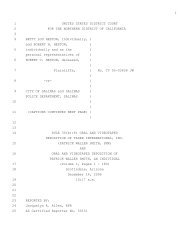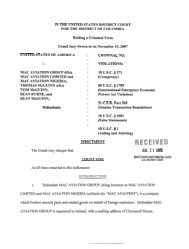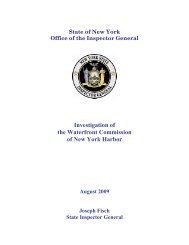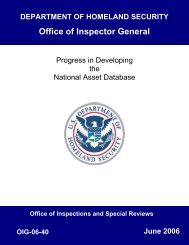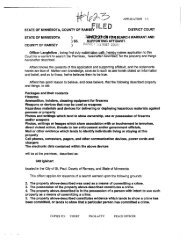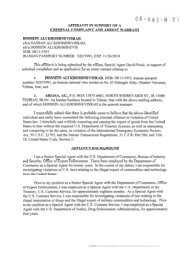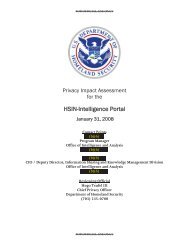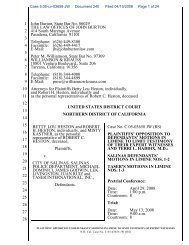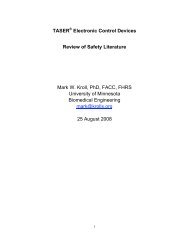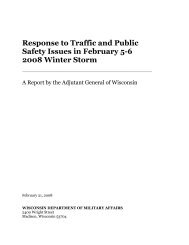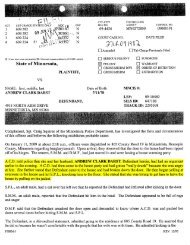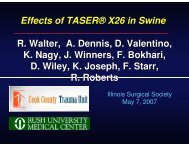Cite as: 547 U. S. ____ (2006)5SOUTER, J., dissentingAs for <strong>the</strong> importance <strong>of</strong> such speech to <strong>the</strong> individual, itstands to reason that a citizen may well place a very highvalue on a right to speak on <strong>the</strong> public issues he decides tomake <strong>the</strong> subject <strong>of</strong> his work day after day. Would anyonedoubt that a school principal evaluating <strong>the</strong> performance<strong>of</strong> teachers for promotion or pay adjustment retains acitizen’s interest in addressing <strong>the</strong> quality <strong>of</strong> teaching in<strong>the</strong> schools? (Still, <strong>the</strong> majority indicates he could be firedwithout First Amendment recourse for fair but unfavorablecomment when <strong>the</strong> teacher under review is <strong>the</strong> superintendent’sdaughter.) Would anyone deny that a prosecutorlike Richard <strong>Ceballos</strong> may claim <strong>the</strong> interest <strong>of</strong> anycitizen in speaking out against a rogue law enforcement<strong>of</strong>ficer, simply because his job requires him to express ajudgment about <strong>the</strong> <strong>of</strong>ficer’s performance? (But <strong>the</strong> majoritysays <strong>the</strong> First Amendment gives <strong>Ceballos</strong> no protection,even if his judgment in this case was sound andappropriately expressed.)Indeed, <strong>the</strong> very idea <strong>of</strong> categorically separating <strong>the</strong>citizen’s interest from <strong>the</strong> employee’s interest ignores <strong>the</strong>fact that <strong>the</strong> ranks <strong>of</strong> public service include those whoshare <strong>the</strong> poet’s “object . . . to unite [m]y avocation and myvocation;” 3 <strong>the</strong>se citizen servants are <strong>the</strong> ones whose civicinterest rises highest when <strong>the</strong>y speak pursuant to <strong>the</strong>irduties, and <strong>the</strong>se are exactly <strong>the</strong> ones government employersmost want to attract. 4 There is no question that——————Dist. 205, Will Cty., 391 U. S. 563 (1968), may be diminished by expansivestatements <strong>of</strong> employment duties.The majority’s response, that <strong>the</strong> enquiry to determine duties is a“practical one,” ante, at 13, does not alleviate this concern. It sets out astandard that will not discourage government employers from settingduties expansively, but will engender litigation to decide which statedduties were actual and which were merely formal.3R. Frost, Two Tramps in Mud Time, Collected Poems, Prose, &Plays 251, 252 (R. Poirier & M. Richardson eds. 1995).4Not to put too fine a point on it, <strong>the</strong> Human Resources Division <strong>of</strong><strong>the</strong> Los Angeles County District Attorney’s Office, <strong>Ceballos</strong>’s employer,
6 GARCETTI v. CEBALLOSSOUTER, J., dissentingpublic employees speaking on matters <strong>the</strong>y are obliged toaddress would generally place a high value on a right tospeak, as any responsible citizen would.Nor is <strong>the</strong>re any reason to raise <strong>the</strong> counterintuitivequestion whe<strong>the</strong>r <strong>the</strong> public interest in hearing informedemployees evaporates when <strong>the</strong>y speak as required onsome subject at <strong>the</strong> core <strong>of</strong> <strong>the</strong>ir jobs. Two Terms ago, werecalled <strong>the</strong> public value that <strong>the</strong> Pickering <strong>Court</strong> perceivedin <strong>the</strong> speech <strong>of</strong> public employees as a class: “Underlying<strong>the</strong> decision in Pickering is <strong>the</strong> recognition thatpublic employees are <strong>of</strong>ten <strong>the</strong> members <strong>of</strong> <strong>the</strong> communitywho are likely to have informed opinions as to <strong>the</strong> operations<strong>of</strong> <strong>the</strong>ir public employers, operations which are <strong>of</strong>——————is telling anyone who will listen that its work “provides <strong>the</strong> personalsatisfaction and fulfillment that comes with knowing you are contributingessential services to <strong>the</strong> citizens <strong>of</strong> Los Angeles County.” CareerOpportunities, http://da.co.la.ca.us/hr/default.htm (all Internet materialsas visited May 25, 2006, and available in Clerk <strong>of</strong> <strong>Court</strong>’s case file).The <strong>United</strong> <strong>States</strong> expresses <strong>the</strong> same interest in identifying <strong>the</strong>individual ideals <strong>of</strong> a citizen with its employees’ obligations to <strong>the</strong>Government. See Brief as Amicus Curiae 25 (stating that publicemployees are motivated to perform <strong>the</strong>ir duties “to serve <strong>the</strong> public”).Right now, for example, <strong>the</strong> U. S. Food and Drug Administration isappealing to physicians, scientists, and statisticians to work in <strong>the</strong>Center for Drug Evaluation and Research, with <strong>the</strong> message that <strong>the</strong>y“can give back to [<strong>the</strong>ir] community, state, and country by making adifference in <strong>the</strong> lives <strong>of</strong> Americans everywhere.” Career Opportunities atCDER: You Can Make a Difference, http://www.fda.gov/cder/career/default.htm.Indeed, <strong>the</strong> Congress <strong>of</strong> <strong>the</strong> <strong>United</strong> <strong>States</strong>, by concurrent resolution,has previously expressly endorsed respect for a citizen’s obligations as<strong>the</strong> prime responsibility <strong>of</strong> Government employees: “Any person inGovernment Service should: . . . [p]ut loyalty to <strong>the</strong> highest moralprinciples and to country above loyalty to persons, party, or Governmentdepartment,” and shall “[e]xpose corruption wherever discovered,”Code <strong>of</strong> Ethics for Government Service, H. Con. Res. 175, 85th Cong.,2d Sess., 72 Stat. B12. Display <strong>of</strong> this Code in Government buildingswas once required by law, 94 Stat. 855; this obligation has been repealed,Office <strong>of</strong> Government Ethics Authorization Act <strong>of</strong> 1996, Pub. L.1<strong>04</strong>–179, §4, 110 Stat. 1566.
- Page 1 and 2: (Slip Opinion) OCTOBER TERM, 20051S
- Page 3 and 4: Cite as: 547 U. S. ____ (2006)3Syll
- Page 5 and 6: 2 GARCETTI v. CEBALLOSOpinion of th
- Page 7 and 8: 4 GARCETTI v. CEBALLOSOpinion of th
- Page 9 and 10: 6 GARCETTI v. CEBALLOSOpinion of th
- Page 11 and 12: 8 GARCETTI v. CEBALLOSOpinion of th
- Page 13 and 14: 10 GARCETTI v. CEBALLOSOpinion of t
- Page 15 and 16: 12 GARCETTI v. CEBALLOSOpinion of t
- Page 17 and 18: 14 GARCETTI v. CEBALLOSOpinion of t
- Page 19 and 20: 2 GARCETTI v. CEBALLOSSTEVENS, J.,
- Page 21 and 22: 2 GARCETTI v. CEBALLOSSOUTER, J., d
- Page 23: 4 GARCETTI v. CEBALLOSSOUTER, J., d
- Page 27 and 28: 8 GARCETTI v. CEBALLOSSOUTER, J., d
- Page 29 and 30: 10 GARCETTI v. CEBALLOSSOUTER, J.,
- Page 31 and 32: 12 GARCETTI v. CEBALLOSSOUTER, J.,
- Page 33 and 34: 14 GARCETTI v. CEBALLOSSOUTER, J.,
- Page 35 and 36: 16 GARCETTI v. CEBALLOSSOUTER, J.,
- Page 37 and 38: 18 GARCETTI v. CEBALLOSSOUTER, J.,
- Page 39 and 40: 2 GARCETTI v. CEBALLOSBREYER, J., d
- Page 41 and 42: 4 GARCETTI v. CEBALLOSBREYER, J., d
- Page 43: 6 GARCETTI v. CEBALLOSBREYER, J., d



